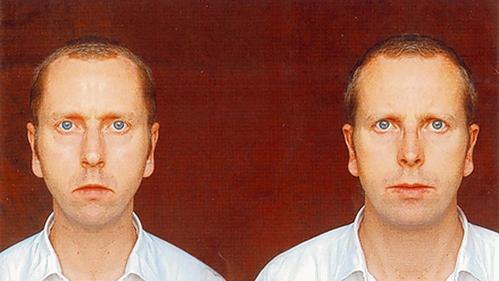#dalkey archive

(Edouard Levé in a manipulated portrait)
Of course, don’t miss the amazing Works by Edouard Levé, translated by Jan Steyn for The Dalkey Archive. The thesis of the book is captured in its first point: “1. A BOOK OF WORKS THAT THE AUTHOR HAS CONCEIVED BUT NOT BROUGHT INTO BEING.” That’s just the start.
3. Proust’s head is drawn on a page of In Search of Lost Time. The words tracing out the contour of his face form a grammatically correct sentence.
15. A leather jacket made from a mad cow.
19. A butterfly is released into a room, hidden from sight. Every night, its flight, detected by laser beams, is transmitted to a mobile machine equipped with an hourglass. By morning, the imprint of the nocturnal flight is drawn in sand on the floor.
26. A building is transformed into a cemetery. The rooms become vaults.
35. Fake drawings by artists from the early twentieth century are folded up and inserted into books in provincial libraries. The books are chosen for the coincidence of their dates of publication and the supposed dates of the drawings. At an undetermined date, a reader discovers the work. Not imagining that it might be a fake, since the usual motive for forgery – the financial enrichment of the forger – is not operative here, experts authenticate the drawing. The artist’s body of works is augmented. Wrongly so.
Shockingly awesome.
-Hal-
There aren’t a whole hell of a lot of books I get excited about, but this is one of them: Fancy by Jeremy M. Davies. Jeremy is the Senior Editor at The Dalkey Archive, and a damn good writer to boot. His first book, Rose Alley, is so jam packed with narrative goodies that you get to feeling every single sentence could veer off and become its own 250-page novel at any moment. It’s like Pynchon and Ronald Firbank had a love child who did nothing but watch nasty films and memorize words like “frottage.” Fancy is composed of a series of pet-sitting instruction from an elderly shut-in to a young couple. If that doesn’t get you going I’m not sure what will. But really, this is mad, maddeningly good stuff, like Bernhard on a softer, funnier, more thoughtful day. Check out this opening:
Rumrill said (for that was his name): Why not let us settle in with a blunt sort of proclamation, a postulate, for example that this space here, where we sniff and shuffle, is located in my home, Rumrill’s home; and that these cats, were any cats present, are my cats, the cats of Rumrill. And then, with all of that said, I might take a breath and illustrate my testimony; I might extend a finger in the direction of my ceiling or walls, at one or another of my little animals–if any had been brave enough to join us–after which demonstration you would be forced to admit, or else persuaded, or else enticed, that I had made myself clear.
He added: Myself, which is to say, Rumrill.
Out in November on the amazing Ellipsis Press.
-Hal-

